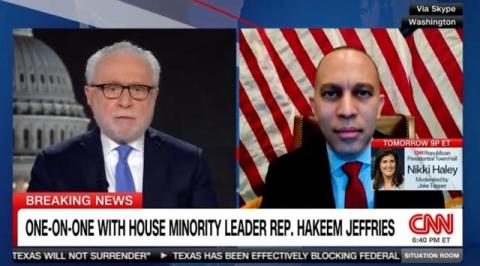LEADER JEFFRIES: "THERE'S NO LEGISLATION THAT IS GOING TO MOVE IN THE HOUSE UNLESS IT HAS BIPARTISAN SUPPORT"
Washington, DC – Today, Democratic Leader Hakeem Jeffries appeared on CNN's The Situation Room with Wolf Blitzer where he emphasized that House Democrats will continue to support our allies and work to prevent a dangerous government shutdown.

BLITZER: Joining me now is the House Minority Leader, Congressman Hakeem Jeffries. He was inside the White House for that important meeting. Leader Jeffries, thanks so much for joining us. The supplemental package, as you well know, includes aid for Israel, for Ukraine, for Taiwan and U.S. border security all wrapped up in this package. Are you any closer after this meeting to passing this critical funding?
JEFFRIES: Well, good evening Wolf, great to be with you. I'm very thankful that President Joe Biden convened the legislative leadership from both sides of the aisle and both sides of the Capitol to talk about America's national security interests, which include making sure that we are there for democracies like Ukraine and Israel, as well as, of course, our allies in the Indo-Pacific, while at the same time providing humanitarian assistance to Palestinian civilians who are in harm's way through no fault of their own and other civilians who are in conflict zones throughout the world. It was a productive, forward looking, positive conversation that hopefully will yield some bipartisan progress in the days or weeks to come.
BLITZER: We will find out fairly soon, I'm sure. CNN has learned, Leader Jeffries, that the House Speaker, Mike Johnson, told Republicans the version of this bill being negotiated in the Senate right now is, in his words, dead on arrival in the House. Did anything in this meeting today over at the white House with the President change that?
JEFFRIES: My view is it's premature to make any assessments about whether legislation should be voted up or down until both Republicans and Democrats have an opportunity to evaluate the four corners of the legislation. It is clear and the central focus of the meeting at the White House was the urgent need to support the Ukrainian war effort so that our allies can continue to push back against Russian aggression. It's the right thing to do for the Ukrainian people, but equally significant, it's the right thing to do for democracy, for freedom, for truth, for our NATO allies and for our Western European allies and, ultimately, for the national security interests of the United States of America. That's why I'm hopeful that we can make some bipartisan progress. There's no legislation that is going to move in the House unless it has bipartisan support.
BLITZER: Did President Biden, Leader Jeffries, make any-any further concessions to Republicans on the sensitive issue of immigration?
JEFFRIES: Well, there were no negotiations that were taking place in the room. It was a discussion about the importance of both addressing our national security needs and, at the same time, trying to find a path forward as it relates to addressing some of the challenges at the border. From my standpoint, if that's done it's got to be something that's effective, that's reasonable, that's bipartisan and that is consistent with American values, both as a nation of immigrants and as a nation that is rooted in the rule of law.
BLITZER: On top of all of this, Leader Jeffries, the government, as you well know, is set to partially shut down in just three days. House Speaker Johnson is facing pressure from hardliners to walk away from the bipartisan spending deal. What needs to happen between now and Friday to get this bill passed?
JEFFRIES: Speaker Johnson is a man of his word and a man of good faith who is dealing with a very raucous group of individuals on the other side of the aisle, many of whom want to shut the government down. However, we have reached a bipartisan agreement on a topline spending number that, in our view, as House Democrats, meets the needs of the American people. The Appropriators are now in the process of negotiating those spending bills. On the Democratic side, we're in very good hands with Rosa DeLauro, and we are going to work to reach agreement in a way that funds the government in a manner consistent with providing for the health, the safety and the economic well-being of the American people. And I'm confident that we are going to be able to avoid a government shutdown.
BLITZER: Critically important. At the same time, though, a single Senator can slow this process down big time and threaten a government shutdown. Did the President wait too long to bring the congressional leadership from the House and the Senate, Democrats and Republicans, to the White House?
JEFFRIES: Not at all. I'm very confident that we are on track in the Senate and, of course, in the House to make sure that the bipartisan continuing resolution – that has been negotiated and signed off on by all four corners of the Congress – is going to be able to be enacted into law by the end of the week and avoid the partial government shutdown that might otherwise kick in on January 19.
BLITZER: Democratic Leader Hakeem Jeffries of New York. Thanks, as usual, for joining us. I know this is a very busy day.
JEFFRIES: Thank you.
Full interview can be watched here